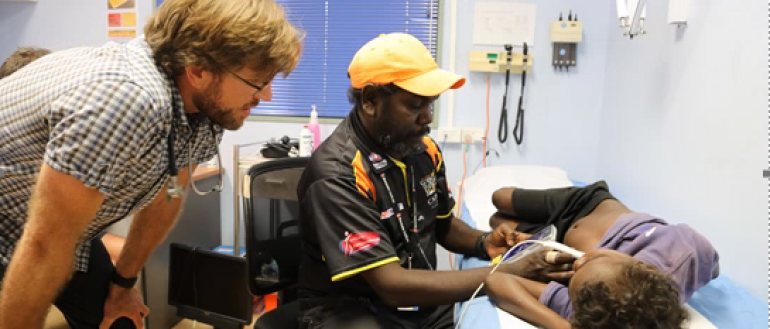Funders:
- National Health and Medical Research Council (NHMRC).
Project title:
Early detection and treatment of rheumatic heart disease (RHD) in high risk communities using community led approaches for active case finding, education and engagement in care.
Aims:
- To facilitate early diagnosis, effective treatment and improved clinical outcomes for individuals with RHD through community education and local practitioner-delivered echocardiography.
Objectives:
- To develop and evaluate training in an ultra-abbreviated screening echocardiography technique: Single Parasternal Long Axis with Sweep echocardiography using a Handheld ultrasound device (SPLASH) for non-expert practitioners, including Aboriginal Health Practitioners;
- To determine the diagnostic accuracy of the SPLASH echocardiography protocol performed by briefly trained, non-expert practitioners for the detection of RHD;
- To evaluate social and emotional impacts, and community perceptions of active community participation and leadership in RHD activities in remote Aboriginal communities in the NT;
- To study clinical outcomes, and access to medical and surgical management, resulting from community led RHD initiatives in remote Aboriginal communities in the NT.
Summary:
RHD is a potentially life-threatening complication of acute rheumatic fever (ARF) following infection with Streptococcus pyogenes. Aboriginal and Torres Strait Islander people living in the Northern Territory (NT) are at least 125 times more likely to develop RHD compared to non-Indigenous Australians. Early detection and treatment dramatically improve life expectancy for those effected by RHD. It has been determined echocardiography can be used to facilitate diagnosis, however the need for highly trained experts, expensive equipment and community acceptance have been barriers to large-scale implementation.
Recent studies have focused on overcoming these barriers by trialling the use of handheld echocardiography devices used by non-expert practitioners with limited training and assessing the results for accuracy. Strong community engagement was at the core of these recent studies and will continue to be built upon going forward. A model that engages community, school, clinical services, local government, and traditional owners is likely to impact not only on case detection, but also on treatment adherence, clinical outcomes and momentum within communities towards ending RHD as a public health problem.
Implications for policy and practice:
This research will increase knowledge about the early detection of RHD, and influence policy and guideline recommendations regarding echocardiography screening in Australia. This project will also inform approaches to community and health worker education and training, with the potential to significantly improve the capacity of communities to develop and lead local initiatives targeting RHD and other similar health priorities.
Our research has found:
This project will build on previous research of Dr Francis and colleagues which has shown that single parasternal long axis view echocardiography with a sweep (SPLASH) has excellent sensitivity for the detection of RHD, when performed by an expert.
The Pedrino study, which evaluated SPLASH echocardiography performed by non-expert practitioners using handheld devices, showed moderate sensitivity (0.75) for the detection of definite RHD. The ongoing Rapid Echocardiography for Congenital And Rheumatic heart Disease – Investigating a New Approach (RECARDINA) study features significant improvements to the training provided to non-expert practitioners, based on learnings from the Pedrino study. Preliminary results suggest a significant improvement in the accuracy of SPLASH echocardiography conducted by briefly trained non-expert practitioners in the RECARDINA study.
Chief investigator:
Project manager:
- Meghan Bailey
Contact information:
For more information about the project, email here.
Project dates:
The project will commence in January 2021 and conclude in December 2025.
- Davis, K., Remenyi, B., Draper, A. D., Dos Santos, J., Bayley, N., Paratz, E., Reeves, B., Appelbe, A., Cochrane, A., Johnson, T. D., Korte, L. M., Do Rosario, I. M., Da Silva Almeida, I. T., Roberts, K. V., Carapetis, J. R., & Francis, J. R. (2018). Rheumatic heart disease in Timor-Leste school students: an echocardiography-based prevalence study. The Medical Journal of Australia, 208(7), 303–307.
- Remenyi, B., Davis, K., Draper, A., Bayley, N., Paratz, E., Reeves, B., Appelbe, A., Wheaton, G., da Silva Almeida, I. T., Dos Santos, J., Carapetis, J., & Francis, J. R. (2019). Single Parasternal-Long-Axis-View-Sweep Screening Echocardiographic Protocol to Detect Rheumatic Heart Disease: A Prospective Study of Diagnostic Accuracy. Heart, Lung & Circulation, S1443-9506(19), 30602-X. Advance online publication. https://doi.org/10.1016/j.hlc.2019.02.196
- Francis, J. R., Gargan, C., Remenyi, B., Ralph, A. P., Draper, A., Holt, D., Krause, V., & Hardie, K. (2019). A cluster of acute rheumatic fever cases among Aboriginal Australians in a remote community with high baseline incidence. Australian and New Zealand Journal of Public Health, 43(3), 288–293. https://doi.org/10.1111/1753-6405.12893

